Find free Louisiana divorce records through the knowledge, search tools, and record custodian contact details throughout this resource.
Whether you’re searching for your own divorce records or someone else’s, this right is provided through Louisiana’s Public Records Law and the federal Freedom of Information Act (FOIA).
Divorce or dissolution of marriage records can help you learn more about a person in your life, or they can be a key tool for a genealogy search if someone is trying to learn more about their family history. You may also need to request an official copy of a divorce certificate to provide one’s marital status for a specific legal or business reason.
Follow the steps outlined in this article to search for free divorce information in Louisiana.
Who Can View Divorce Records in the State of Louisiana?
In Louisiana, the rights provided by Louisiana’s Public Records Law extend to divorce matters. Anyone can access divorce records, regardless of their reason.1
In some states, divorce records may be public information, but certain types of information related to it may be restricted. For instance, a state may allow access to divorce case records but restrict a certificate or divorce decree to only certain qualified people.
The following is a brief summary of the types of divorce records people are typically looking to access or request.
Divorce Case Records: Court documents that provide information on filings, pleadings, and the outcome of a filed petition for divorce. Divorce case records can tell you when a case was filed, what happened throughout the process and when the judge ordered the dissolution of the marriage.
Certificate of Divorce: The certificate is usually issued by a state agency (e.g., Department of Health) for the simple purpose of confirming that someone was divorced. The certificate is usually limited in the information it provides, typically providing the party’s names and when their marriage ended.
Decree: This is the official document from the court that details when a party was divorced, along with the specific terms of the divorce. The decree can include settlement terms, alimony, child custody and other issues related to the dissolution of the marriage.
In Louisiana, there are no restrictions on who can access the case records or the decree (even a certified copy). However, in Louisiana, there is no option for requesting a certificate of divorce from a state agency; all divorce records are maintained solely with the Clerk of Court in the Parish where the divorce occurred.
In addition to these types of records, a citizen can access divorce rates in Louisiana. You can get information from both the census and the Centers for Disease Control and Prevention National Center for Health Statistics.2, 3
The most recent data (2021) indicates that the current divorce rate in Louisiana is 2.2 divorces per 1,000 people.
How To Check Louisiana Divorce Records for Free
Many states provide a way to access divorce records at the state level. Options may include a unified case search tool or a certificate of divorce from a state agency such as an Office of Vital Records.
If you want to perform a state-level free public divorce records search in Louisiana, you can do so with the Louisiana Clerk Statewide Portal Search. To use this online search tool, you must first register for a free account. Once you establish and confirm your account, you can begin your search.
This online tool provides a name-based search only. In addition to entering a name, a record seeker can select a filing date range to narrow down the search results. Before processing your search, make sure you select “Civil” to narrow down your results.
While this does not limit your search to only divorce cases, it does avoid other types of records, such as criminal cases, being included with your results.
Once you get your results, you can continue to narrow down your results. You can do so by selecting particular parishes to get to a particular divorce case quicker. Once you click on a particular divorce case, you can get a brief summary of the case.
This includes the docket number, filing date and party names.
The case summary also provides the Clerk of Courts contact information for the particular divorce case. To view more information about the divorce, you will need to reach out to the Clerk as the custodian of these records. Each Clerk of Court will have their own nuances and processes for accessing these records.
There are no state agencies in Louisiana that can provide you with an actual certificate of divorce. Sometimes, an Office of Vital Statistics or a similar agency has the authority to provide a certificate. However, in Louisiana, that authority is solely designated to the Clerk of Court in the Parish where the divorce occurred.
Looking Up Divorce Information in Louisiana via Parish & City Agencies
While you can access limited divorce records at the state level in Louisiana, another option is to obtain them from the records custodian at the parish level. State-level searches are a good starting point, but they will not provide the level of information most people are looking for.
In Louisiana, the record custodian is the Clerk of Court in the Parish where the decree was issued.
Note: Most states have counties. However, in Louisiana, the state is divided into parishes.
Searching for a decree with a particular parish has its limitations, as you will have to know where a party you are searching for was divorced. However, there are benefits to searching at the parish level. A record seeker should be able to talk to someone at the clerk’s office who can give them guidance on the specific processes for requesting a decree and searching the case records.
Louisiana has 64 parishes, and there may be nuances and different processes involved in accessing divorce records.
In order to give you a better idea of how to access these divorce records, below is information on how to do so in the three largest parishes in Louisiana. If you are looking for a divorce record in another parish, contact their Clerk of Court for more information.
The largest population in Louisiana is located in the East Baton Rouge Parish. To access divorce records in this Parish, start by contacting the East Baton Rouge Parish Clerk of Court.4 For specific questions on how divorce records can be requested and processed, you can contact the Clerk by phone at 225-389-3960.
The cost of informational divorce records is $0.60 per page, and a certified record costs $5.00. If you want to call them or go in person, their office is open from 8:00 AM to 4:30 PM. Their primary office is located at the address below:
East Baton Rouge Clerk of Court
P.O. Box 1991
222 Street Louis St.
Baton Rouge, Louisiana 70821
This office is available for requests for public information and copies. If you are looking to access archived divorce records in Baton Rouge, you can check with their archives building located at the address below:
East Baton Rouge Clerk of Court
Downtown Archives Building
444 St. Louis St.
Baton Rouge, Louisiana 70802
The second largest parish in Louisiana is Jefferson Parish. If a citizen would like to access divorce records in Jefferson Parish, one option is to submit an online public records request. However, this is only a good option if you have sufficient information that will be able to identify the record.
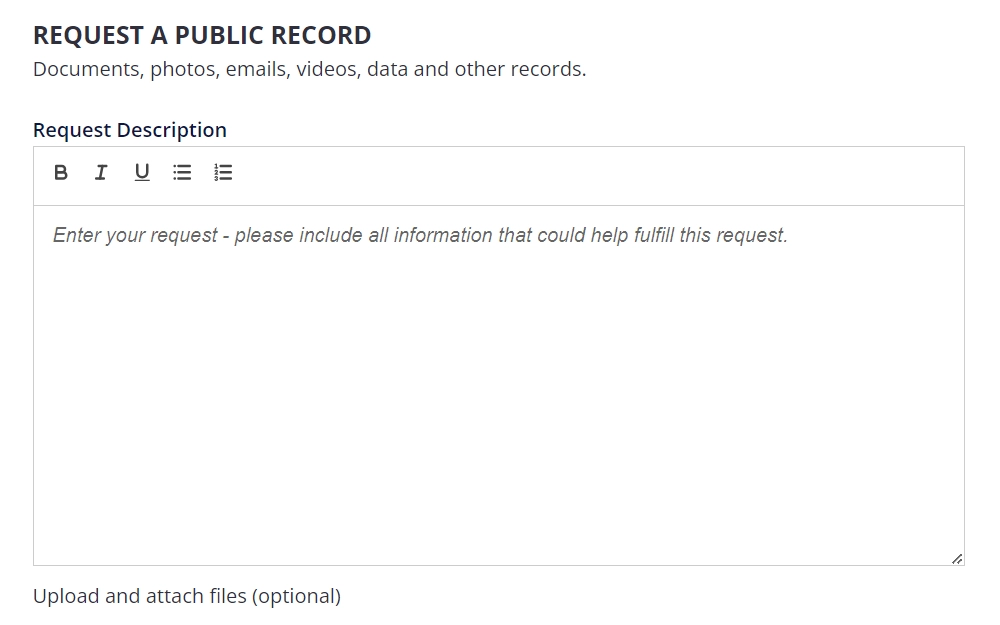
The online request tool allows you to upload any information that will be helpful in making your request, including emails, photos and other information. The Jefferson Parish government charges $0.50 per page for copies up to 50 pages.
Note: This service is for informational records only and does not include certified copies of a divorce record.
To get a certified copy of a divorce record and to search for records in person, start by contacting the Clerk of Court, the custodian for Jefferson Parish divorce records. A citizen can call them at 504-364-2900 to ask them what steps are needed to access and search divorce records. To talk to someone in person, you can go to the address below:
Jefferson Parish Clerk of Court
General Government Building
200 Derbigny St., Suite 5600
Gretna, Louisiana 70053
Like other Parishes in Louisiana, the Jefferson Parish Clerk of Court has an online service for searching divorce records and more (Jeffnet); however, this is a paid service. For free access, you will have to discuss other options with the Clerk.
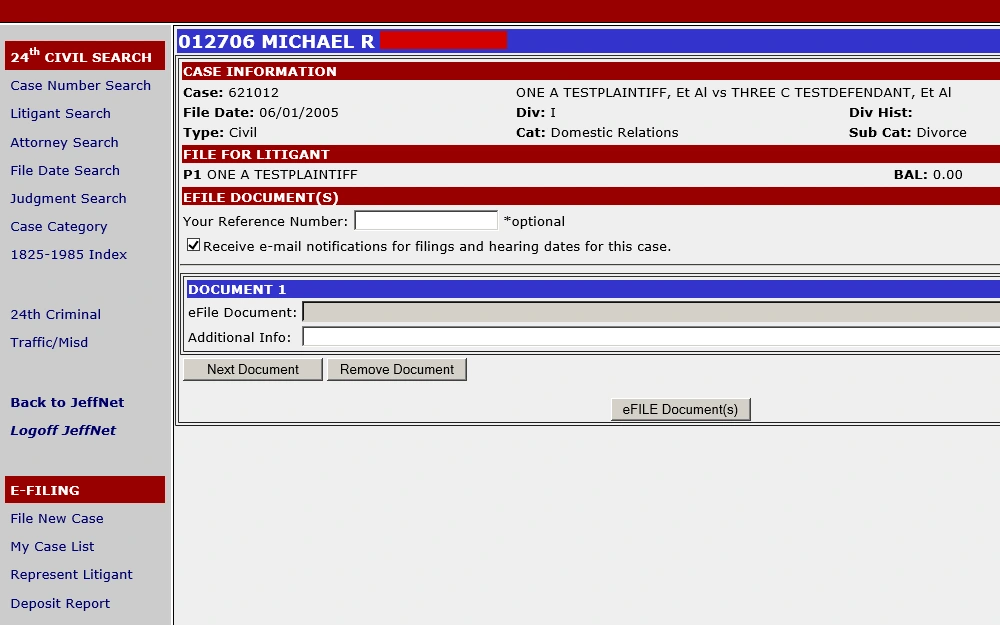
Orleans Parish is the third most populous parish in Louisiana. If a person wants to access divorce records in this parish for free, make an inquiry with the Orleans Clerk of the Civil District Court.7
You can contact them by email at [email protected]. You can also call them by phone at 504-407-0000.
The Clerk of Court is available Monday through Friday, from 8:30 AM to 5:00 PM. If you want to talk to someone in person, you can go to the address below:
Orleans Clerk of Civil District Court
421 Loyola Ave., Rm. 402
New Orleans, Louisiana 70112
If you want to look up older Orleans Parish divorce records, you can contact the Clerk’s Research Center & Historical Documents.8 They have records from as early as 1735 to 1970.
You can contact them by email at [email protected]. You can also call them at 504-407-0106. Like other parishes, Orleans Parish is responsible for maintaining both newer and archived divorce records.
They have various records and indexes, although you will have to contact them to confirm whether they specifically have a divorce index. If you want to go in person to search for archived Orleans Parish divorce records, you can go to the address below:
Orleans Parish Clerk Research Center
1340 Poydras St., Ste. 360
New Orleans, Louisiana 70113
Obtaining Archived Divorce Information for Free via the LA State Archives
When performing a genealogy search, and possibly other reasons, you may need to figure out the best way to access archived public divorce records. In Louisiana, many of its records are decentralized. For this reason, specific Parishes throughout the state have their own options for accessing their archived divorce records.
If you’re looking for a statewide option, you can look through the historical records maintained by the Louisiana State Archives.9 If you find any relevant archived divorce records, you can request copies printed out according to their fee schedule. The research library can be reached for genealogy and research questions at 225-922-1208.
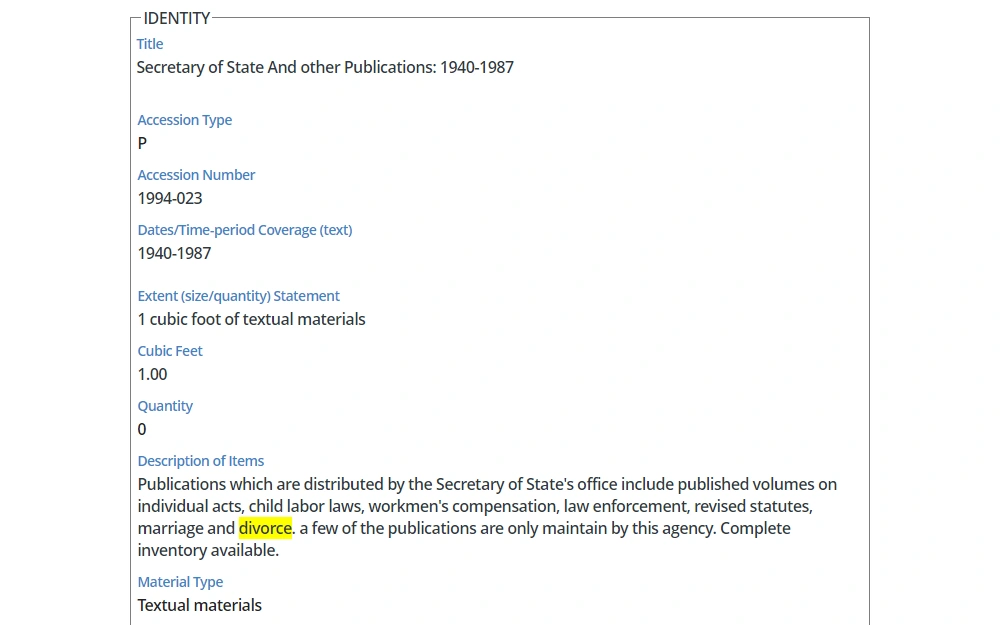
The Archives Research Library is available from 8:00 AM to 4:00 PM, Monday through Friday. A record seeker can schedule an appointment to search their records by phone. The archives library is located at the address below:
Louisiana Archives
3851 Essen Ln.
Baton Rouge, Louisiana 70809
You can also try reaching out to the Custodian of Public Records for the state of Louisiana.11 They can be contacted by phone at 225-922-2880. If you want to talk to someone in person, they are located at the below address:
Custodian of Public Records
8585 Archives Ave.
Baton Rouge, Louisiana 70809
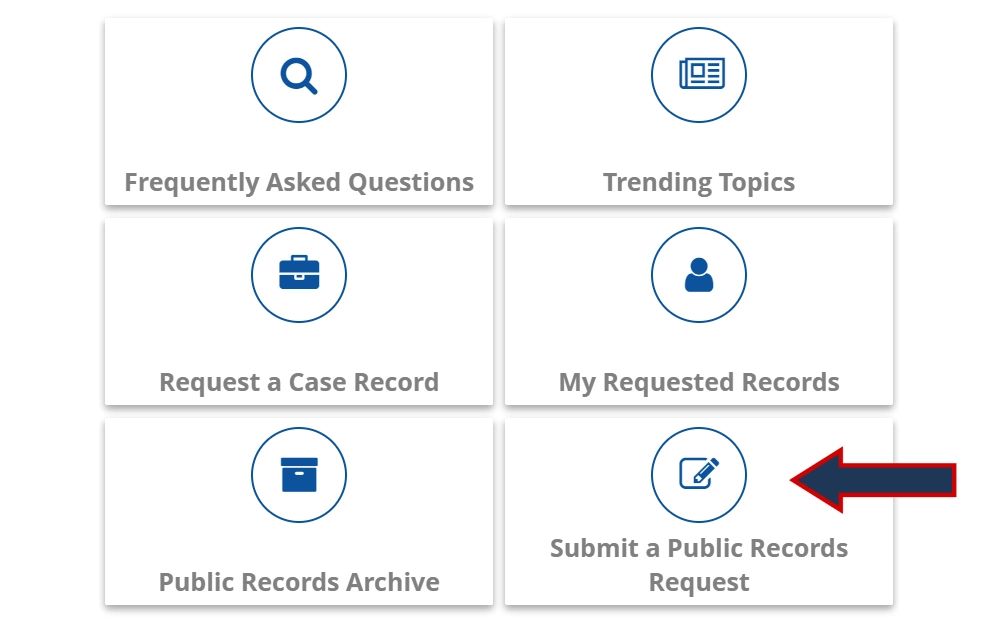
If you have been unable to find the archived divorce records you were searching for, whether a statewide search or localized research with a particular Parish, then you will have to find other ways to access this information. This may be done through historical societies, old newspapers, public libraries and churches. These are just some examples of unique ways you may be able to locate archived divorce records in Louisiana.
How To Search for Dissolution of Marriages & Common Law Divorces in Louisiana
In Louisiana, dissolution of marriage is the legal terminology used for a divorce. If you want to look up information on dissolutions in Louisiana, you can do so the same way you would to look up divorce records.
The Louisiana Clerk Statewide Portal Search will get you started with being able to search for dissolution cases throughout the state. For additional records and a certificate of any dissolution, you will have to contact the clerk of court in the Parish where the divorce was issued.
For traditional marriage, New Orleans no longer provides an option for legal separation. In addition, common law marriage (where parties are considered married by their representations) is not recognized under Louisiana law. As a result, there is no such thing as a common law divorce in Louisiana.
Louisiana does not recognize civil unions by statute.
How To Navigate the Louisiana Divorce Process: Filing & Addressing Petitions
Navigating a major life change such as divorce can feel like a daunting task, but it doesn’t have to be. While this may be a difficult time, understanding the first steps in the divorce process can provide great relief. Here is some basic information for those filing or addressing a Petition for Divorce in Louisiana.13
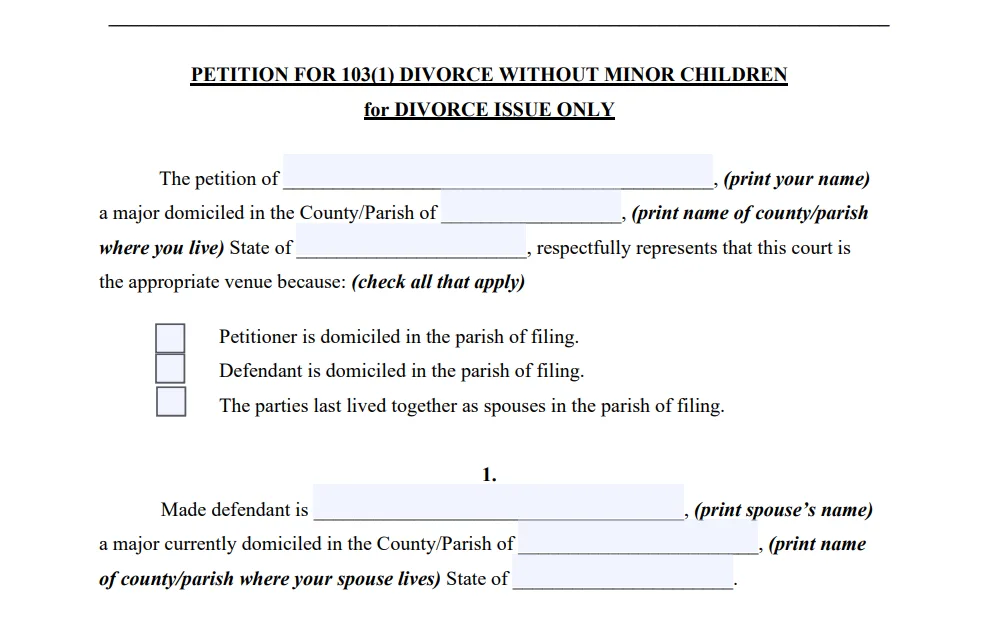
Like other states, Louisiana has a residency requirement for filing a divorce. In Louisiana, at least one person has to establish a domicile before a petition for divorce can be filed. Domicile is established if a person has lived in Louisiana for at least six months.
If residency is established, you then need to determine what type of ground for divorce you can and should proceed with. You can end your nuptials with either a no-fault or at-fault divorce. At-fault divorce requires evidence that your spouse violated the marriage in certain ways, such as adultery, desertion or a criminal act.
No-fault divorce just requires that the marriage is irretrievably broken. However, the timing of when you can file depends on a couple of factors.
If you have no children, you can file a no-fault divorce after being separated for 180 days. If you have children, you can file after being separated for 365 days.
Once you make this determination, you can file your Petition for divorce, either with children or without children. The Petition, along with the filing fee, will have to be submitted in the Parish where you or your spouse are domiciled. In addition, you will also have to serve the divorce petition on your future ex-husband or ex-wife.
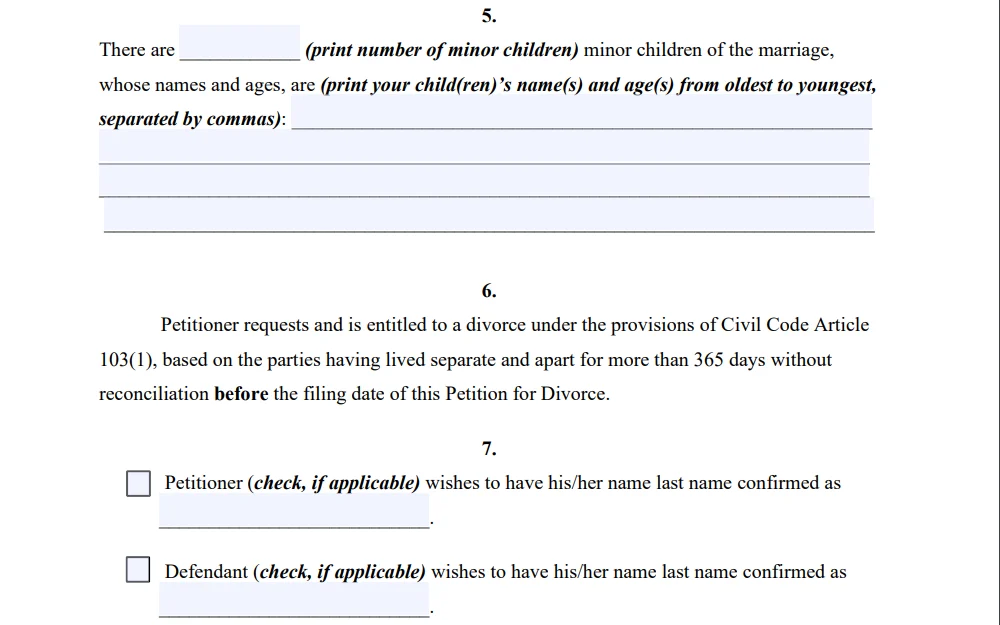
If the divorce is uncontested, it means the parties agree to everything. However, many divorces are contested.
If you are a person receiving divorce papers, and you disagree with any terms of the petition, you can file an answer. An answer must be submitted within 15 days from when the petition was received.
Here, you can address how you think various matters should be resolved, such as child custody (biological and through adoption), spousal support, division of assets and more.
If you are not dealing with a simple, uncontested divorce, it is wise to at least seek the advice of a Louisiana attorney who specializes in family law. They can help walk you through the entire process, answer questions specific to your situation and clarify any nuances in the law.
You now should have a better understanding of the dissolution process and how to access divorce records. With this knowledge, you are now prepared to access Louisiana divorce records for whatever reason you need them.
For further information on residents throughout the state, you can look up Louisiana marital records or conduct a free LA public record search (includes search instructions for property taxes, background checks, births, deaths, warrants, inmates, and more).
References
1Louisiana Department of Justice. (2018, November 19). Louisiana Public Records Law. BRLA.gov. Retrieved November 10, 2023, from <https://www.brla.gov/DocumentCenter/View/7145/LADOJ-Public-Records-Presentation-Outline>
2United States Census Bureau. (2022). divorce – Census Bureau Tables. Retrieved November 10, 2023, from <https://data.census.gov/table?q=divorce&g=040XX00US22>
3National Center for Health Statistics, Centers for Disease Control and Prevention. (2021). Divorce Rates by State: 2019-2021. CDC. Retrieved November 10, 2023, from <https://www.cdc.gov/nchs/pressroom/sosmap/divorce_states/divorce_rates.htm>
4East Baton Rouge Clerk of Court. (n.d.). Online Access Services. Retrieved November 10, 2023, from <https://ebrclerkofcourt.org/Online-Access-Services>
5Jefferson Parish, LA. (n.d.). Make request – NextRequest – Modern FOIA & Public Records Request Software. Public Records Requests. Retrieved November 10, 2023, from <https://jeffersonparishla.nextrequest.com/requests/new>
6Jefferson Parish Clerk of Court. (n.d.). efile civ. JeffNet. Retrieved November 13, 2023, from <https://ssl.jpclerkofcourt.us/images/efile_civ.png>
7Orleans Parish Civil Clerk of Court. (n.d.). Civil Division. Retrieved November 10, 2023, from <https://www.orleanscivilclerk.com/civil_home.html>
8Orleans Parish Civil Clerk of Court. (n.d.). Research Center & Historical Documents. Retrieved November 10, 2023, from <https://www.orleanscivilclerk.com/research.htm>
9Louisiana Department of State. (n.d.). Research Library. Louisiana Secretary of State. Retrieved November 10, 2023, from <https://www.sos.la.gov/HistoricalResources/ResearchHistoricalRecords/Pages/default.aspx>
10State of Louisiana. (n.d.). Secretary of State And other Publications: 1940-1987. ArchivEra: Portal. Retrieved November 10, 2023, from <https://7073.sydneyplus.com/archive/final/Portal/Default.aspx?lang=en-US>
11Louisiana Department of Children & Family Services. (n.d.). Custodian of Record – Public Record Request. DCFS. Retrieved November 10, 2023, from <https://www.dcfs.louisiana.gov/page/custodian-of-record-public-record-request>
12Louisiana Department of Children & Family Services. (n.d.). LADCFS Public Records Center. Retrieved November 10, 2023, from <https://ladcfs.govqa.us/WEBAPP/_rs/(S(ntgtikny0kbzwi2up5loyqcj))/SupportHome.aspx>
1321st Judicial District Court. (n.d.). Divorce — 21st Judicial District Court. Retrieved November 10, 2023, from <https://www.21stjdc.org/divorce>
1421st Judicial District Court. (2022, March 31). Self-Represented Litigant Petition For 103(1) Divorce (Without Minor Children) For Divorce Issue Only And For Requesting Use Of Allowed Last Name. Retrieved November 10, 2023, from <http://static1.squarespace.com/static/607d87a3a13d08033aa98507/t/625192a3a8a0b76c12a6be8c/1649513123730/Self-Represented+Litigant+Petition+for+Divorce+%28No+Minor+Children%29+-+Fillable.pdf>
1521st Judicial District Court. (2022, March 31). Self-Represented Litigant Petition For 103(1) Divorce (With Minor Children) For Divorce Issue Only And For Requesting Use Of Allowed Last Name. Retrieved November 10, 2023, from <https://static1.squarespace.com/static/607d87a3a13d08033aa98507/t/6251931731d1ee1fad111ecb/1649513240225/Self-Represented+Litigant+Petition+for+Divorce+%28With+Minor+Children%29+-+Fillable.pdf>
